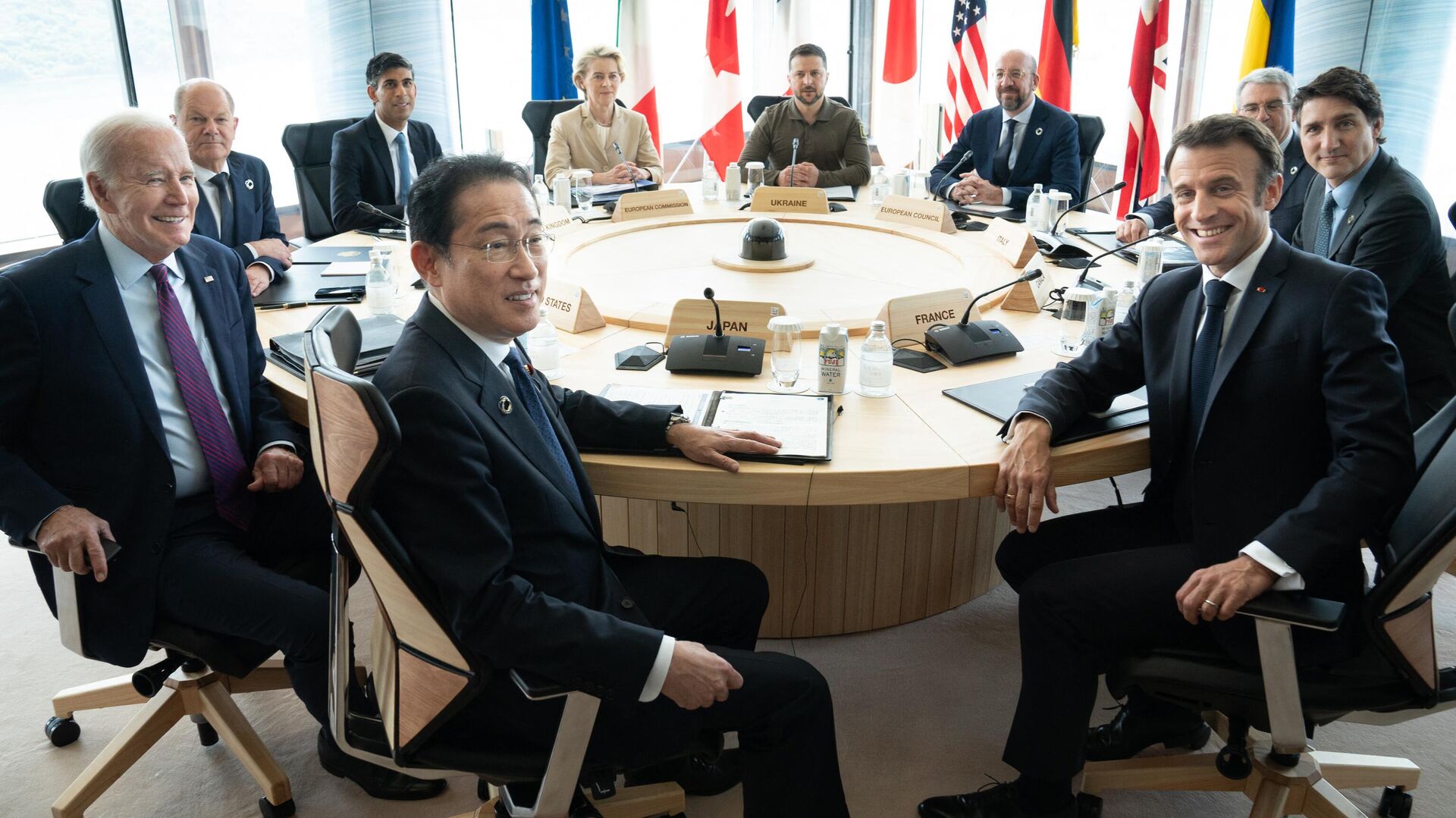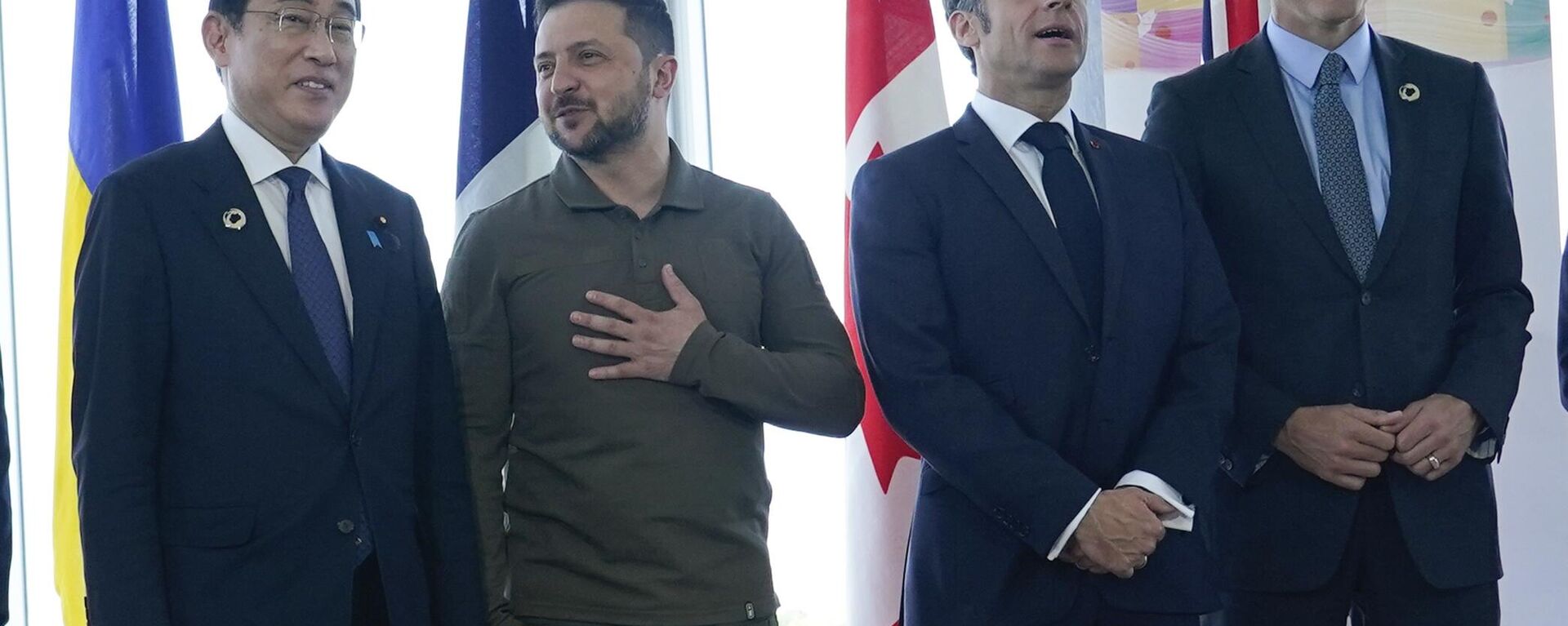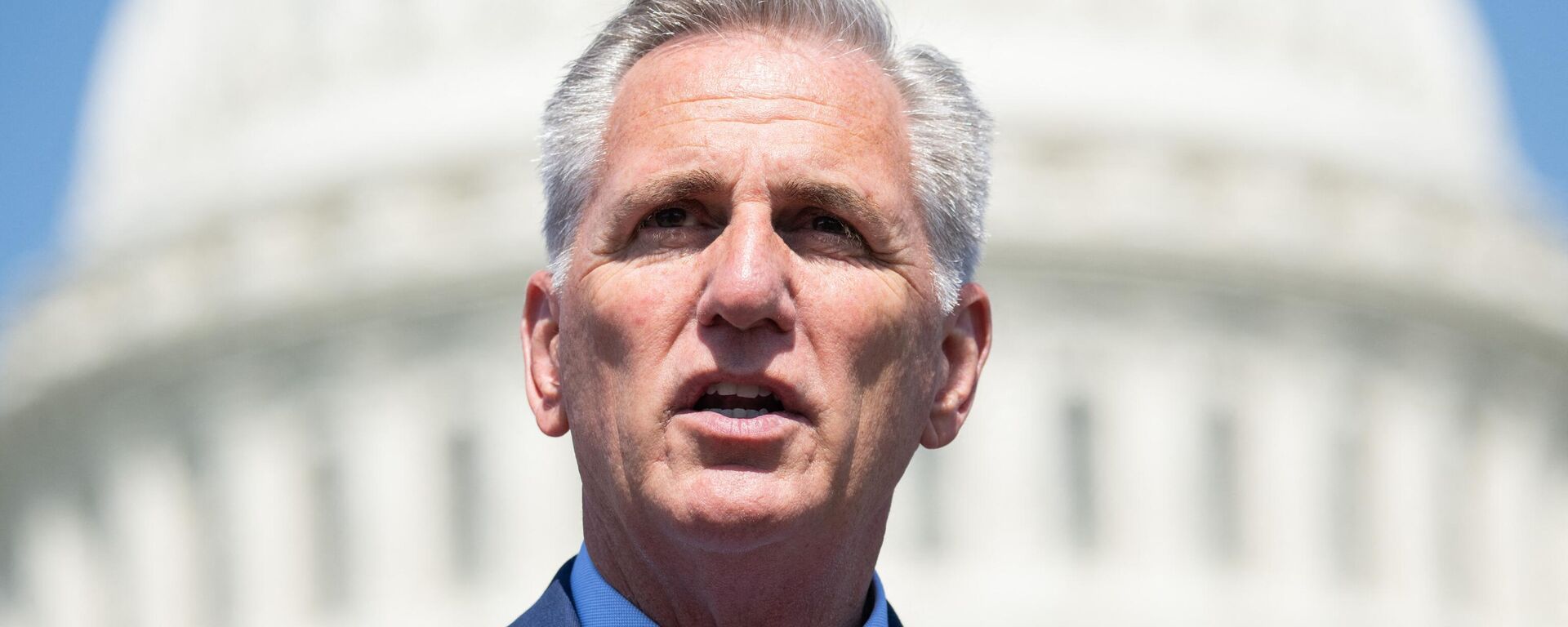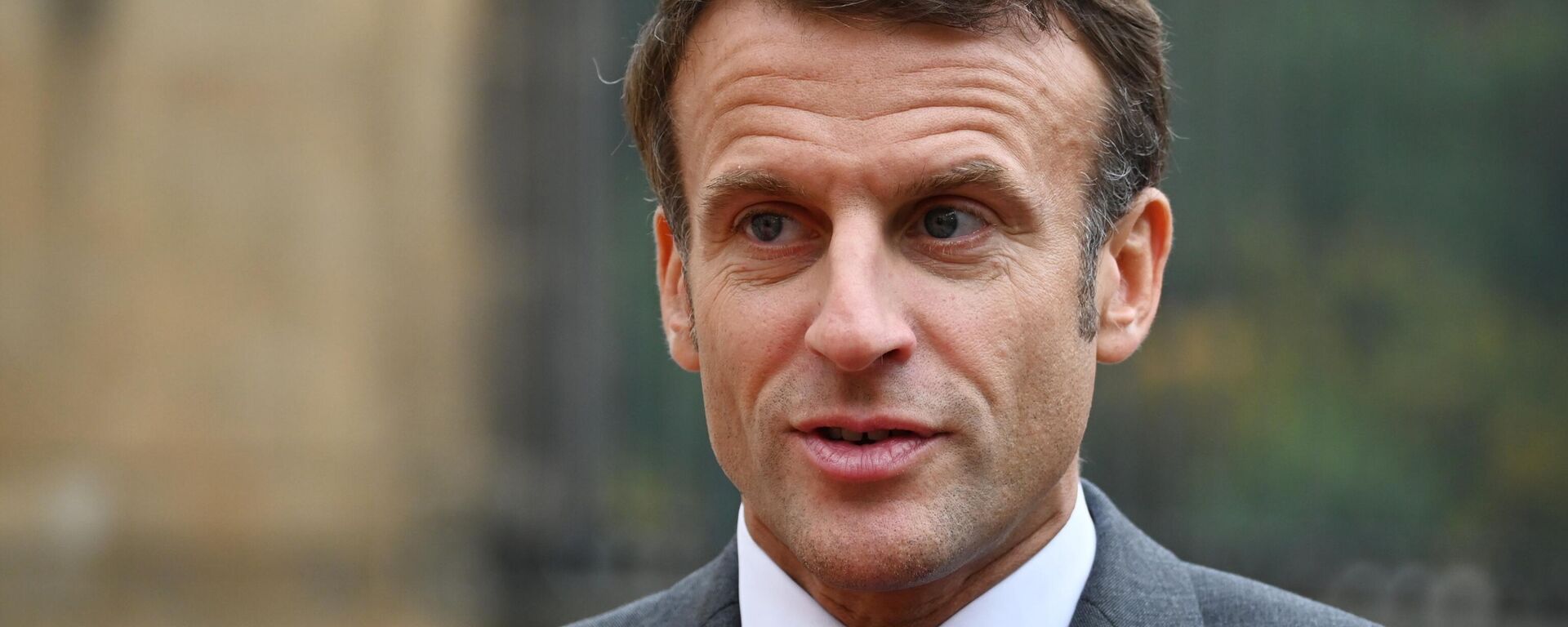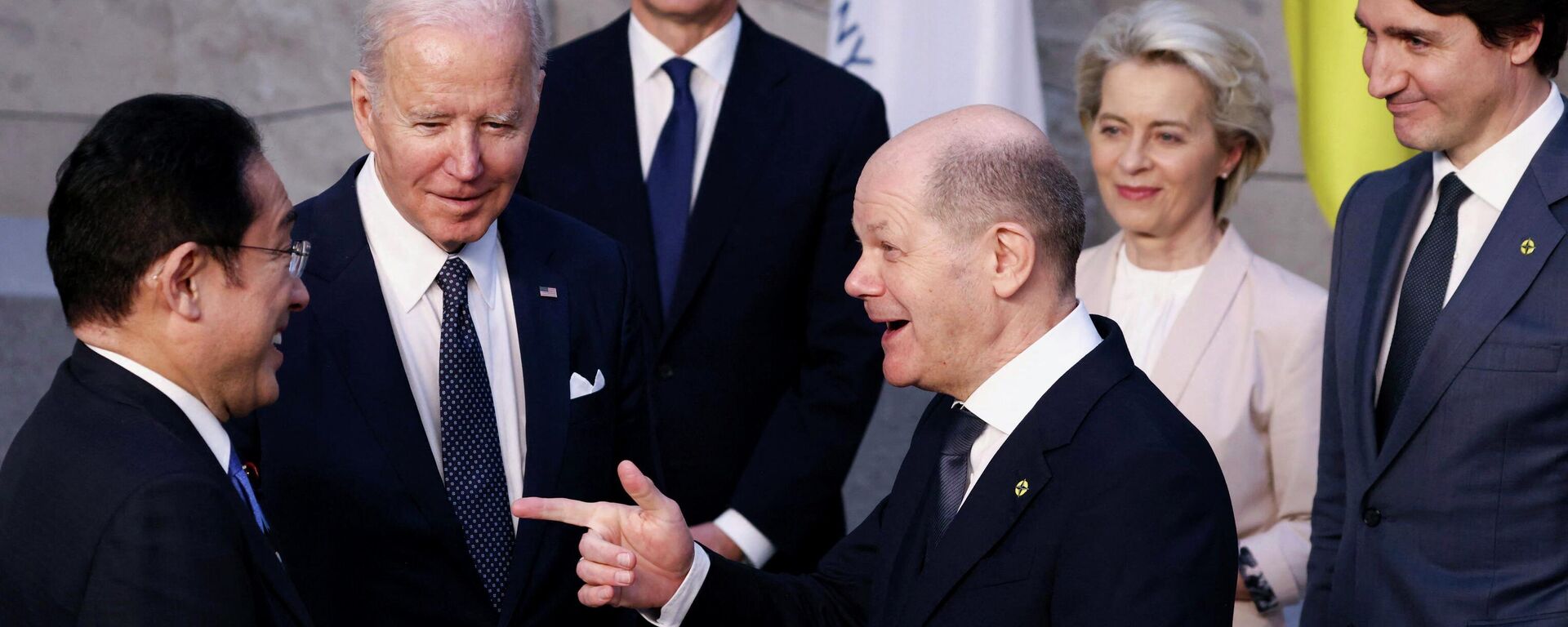https://sputnikglobe.com/20230521/g7-leaders-on-shaky-ground-at-home-pummeled-by-low-approval-ratings--1110497390.html
G7 Leaders 'On Shaky Ground' at Home, Pummeled by Low Approval Ratings
G7 Leaders 'On Shaky Ground' at Home, Pummeled by Low Approval Ratings
Sputnik International
Group of Seven (G7) leaders enjoy low approval ratings at home, a poll shows.
2023-05-21T11:20+0000
2023-05-21T11:20+0000
2023-05-21T11:21+0000
world
g7 summit
g7
joe biden
emmanuel macron
olaf scholz
justin trudeau
hiroshima
ukraine crisis
volodymyr zelensky
https://cdn1.img.sputnikglobe.com/img/07e7/05/15/1110499030_0:161:3071:1888_1920x0_80_0_0_57e6da469dfbf6e95916ffb6dda28ac3.jpg
Group of Seven (G7) leaders pasted on smiles amid backslapping and hugging of Ukraine’s President Volodymyr Zelensky during the last day of their summit in Hiroshima, Japan. However, behind the eagerness to foment the West’s proxy war against Russia, many of them had one thing in common: they are far from popular at home.Propping up the Kiev regime with military support while ratcheting up pressure on Russia and China was the overwhelming focus of attention of the leaders of Japan, the United States, the United Kingdom, Canada, Germany, France, and Italy, as well as the European Union (EU). For all the confidently spouted rhetoric about tackling global challenges like economic instability, poverty, nuclear proliferation, climate change, etc., many of these representatives of the Western political elite have failed miserably to win support in their home countries.Dismal Approval RatingsPlummeting approval ratings are a sign of how electorates assess the leaders' efforts on the home front. Economic woes, raging inflation, divisive policy decisions, the Ukraine conflict and its fallout, complete with the G7's self-harming anti-Russia sanctions, all these factors have fed into the poll battering that these politicians have been faced with. Approval scores above 50 percent were enjoyed by the leaders of just four out of 22 countries analyzed by Morning Consult ahead of the summit. These were India’s Prime Minister Narendra Modi, President Andres Manuel Lopez Obrador of Mexico, Switzerland’s President Alain Berset, and Prime Minister Anthony Albanese of Australia. Modi can boast a 78 percent approval rating, while Italy’s Prime Minister Giorgia Meloni, elected last autumn, drummed up a 49 percent approval rating.The Morning Consult data showed US President Joe Biden with 42 percent, Prime Minister Justin Trudeau of Canada with 39 percent, Chancellor Olaf Scholz of Germany with 34 percent, Prime Minister Rishi Sunak of Britain with 33 percent, Prime Minister Fumio Kishida of Japan with 31 percent, and French President Emmanuel Macron trailing with 25 percent.Here are just some of the compelling examples of G7 leaders talking big on the global stage, yet floundering amid challenges at home.80-year-old US President Joe Biden is a good case in point. The Democratic POTUS had to get on the phone with Washington on Friday, the opening day of the three-day G7 summit, to check on the progress of protracted debt ceiling wrangling with Republicans, US media reported. It was added that Biden then left the leaders’ gala dinner on the island of Miyajima earlier than the others for more phone discussions on how to avert a major default catastrophe.Joe Biden has seen some of the lowest approval ratings of his presidency, as the gaffe-prone octogenarian gears up for a re-election fight in 2024. The Democrat enjoys the approval of little more than a third of Americans, a Washington Post/ABC News poll showed in early May. With an approval rating of 36 percent, in a hypothetical matchup for 2024, Joe Biden trailed Donald Trump with 38 points to 44 points. The approval rating of French President Emmanuel Macron has also plummeted. It dropped to levels unseen since the 2019 yellow vests protests, an IFOP poll commissioned by French magazine Le Journal du Dimanche showed in April, in the wake of the pension reform turmoil. Macron's decision to invoke Article 49.3 of the French constitution, which allowed the government to override the parliament to raise the retirement age, triggered a massive backlash in French society, and battered his approval rating. Macron would lose a rematch to Marine Le Pen, leader of the right-wing National Rally parliamentary group whom he defeated in last year's election, a May poll by the Elabe group for the BFM TV channel showed.If elections were held now in the UK, recent surveys show Prime Minister Rishi Sunak’s Conservative Party would lose to the Labour Party in the wake of steep losses of Tory seats in local elections. “Make no mistake, we are on course for a Labour majority at the next general election,” Labour leader Sir Keir Starmer said earlier in the month.In Germany, an April survey showed the government faced its worst popularity ratings since Chancellor Olaf Scholz's Social Democrats took power together with the Greens and the Free Democratic Party in December 2022. Recent polling revealed that the Social Democratic Party would lose to the Christian Democratic Union in Germany if elections were held now.Approval of Canada’s Prime Minister Justin Trudeau has also dropped, according to the polling results of the Angus Reid Institute, which canvassed almost 5,000 Canadians in March. The Institute states that Trudeau’s approval has slipped down six points in the last three months to 37%. With some 57% of Canadians disapproving of Trudeau, this is his lowest approval rating since September 2021. Furthermore, the ruling Liberal Party has been trailing the principal opposition Conservatives by six percent in voting intention preference. The clobbering at the polls came amid a federal workers' strike in April, and uptick in inflation, and ongoing shortage of housing. Trudeau's Conservative rival, Pierre Poilievre, has pointed to such issues as high inflation and a housing shortage, stressing on social media:"The upshot is an environment in which the leaders of the world’s most powerful democracies have to engage with an ever more challenging world, even as they’re on shaky ground at home," Suzanne Maloney, director of the foreign policy program at the Brookings Institution, was cited by a US media report as saying.As the G7 leaders' personal ratings take a drubbing, so the G7's influence on global politics shrinks. Meanwhile, other emerging blocs and formats, such as the Shanghai Cooperation Organization (SCO) or BRICS, the bloc, which unites the world's largest developing economies — Brazil, Russia, India, China, and South Africa, are rising to prominence, espousing commitment to creating a more equitable and fair global community.
https://sputnikglobe.com/20230521/g7-leaders-zelensky-discuss-ukraine-at-working-session-in-hiroshima-1110493529.html
https://sputnikglobe.com/20230521/white-house-accuses-house-speaker-mccarthy-of-presenting-unacceptable-demands-1110492823.html
https://sputnikglobe.com/20230421/macrons-rating-hits-record-low-due-to-pension-reform---poll-1109734149.html
https://sputnikglobe.com/20230518/g7-hiroshima-summit-fading-bloc-sticking-to-its-guns-to-contain-china-russia-1110444787.html
hiroshima
Sputnik International
feedback@sputniknews.com
+74956456601
MIA „Rossiya Segodnya“
2023
News
en_EN
Sputnik International
feedback@sputniknews.com
+74956456601
MIA „Rossiya Segodnya“
Sputnik International
feedback@sputniknews.com
+74956456601
MIA „Rossiya Segodnya“
group of seven (g7) leaders, g7 summit, g7 in hiroshima, support for ukraine, self-harming anti-russia sanctions, morning consult poll, approval rating, biden approval rating, low approval rating, emmanuel macron approval rating, german chancellor olaf scholz's social democrats, prime minister rishi sunak’s conservative party, uk labour party, approval rating of canada’s prime minister justin trudeau, g7's shrinking influence, shanghai cooperation organization, sco, brics,
group of seven (g7) leaders, g7 summit, g7 in hiroshima, support for ukraine, self-harming anti-russia sanctions, morning consult poll, approval rating, biden approval rating, low approval rating, emmanuel macron approval rating, german chancellor olaf scholz's social democrats, prime minister rishi sunak’s conservative party, uk labour party, approval rating of canada’s prime minister justin trudeau, g7's shrinking influence, shanghai cooperation organization, sco, brics,
G7 Leaders 'On Shaky Ground' at Home, Pummeled by Low Approval Ratings
11:20 GMT 21.05.2023 (Updated: 11:21 GMT 21.05.2023) As leaders of the Group of Seven (G7) nations met for their summit in Hiroshima, Japan, from May 19-21, to focus on the Ukraine conflict, economic security, green investments, and developments in the Indo-Pacific region, many of them are plagued with economic woes and protests at home.
Group of Seven (G7) leaders pasted on smiles amid backslapping and hugging of
Ukraine’s President Volodymyr Zelensky during the last day of their summit in Hiroshima, Japan. However, behind the eagerness to foment the West’s
proxy war against Russia, many of them had one thing in common:
they are far from popular at home.
Propping up the Kiev regime with military support while ratcheting up pressure on Russia and China was the overwhelming focus of attention of the leaders of Japan, the United States, the United Kingdom, Canada, Germany, France, and Italy, as well as the European Union (EU). For all the confidently spouted rhetoric about tackling global challenges like economic instability, poverty, nuclear proliferation, climate change, etc., many of these representatives of the Western political elite have failed miserably to win support in their home countries.
Plummeting approval ratings are a sign of how electorates assess the leaders' efforts on the home front. Economic woes, raging inflation, divisive policy decisions, the Ukraine conflict and its fallout, complete with the G7's self-harming anti-Russia sanctions, all these factors have fed into the poll battering that these politicians have been faced with.
Approval scores above 50 percent were enjoyed by the leaders of just four out of 22 countries analyzed by Morning Consult ahead of the summit. These were India’s Prime Minister Narendra Modi, President Andres Manuel Lopez Obrador of Mexico, Switzerland’s President Alain Berset, and Prime Minister Anthony Albanese of Australia. Modi can boast a 78 percent approval rating, while Italy’s Prime Minister Giorgia Meloni, elected last autumn, drummed up a 49 percent approval rating.
The Morning Consult data showed US President Joe Biden with 42 percent, Prime Minister Justin Trudeau of Canada with 39 percent, Chancellor Olaf Scholz of Germany with 34 percent, Prime Minister Rishi Sunak of Britain with 33 percent, Prime Minister Fumio Kishida of Japan with 31 percent, and French President Emmanuel Macron trailing with 25 percent.
Here are just some of the compelling examples of G7 leaders talking big on the global stage, yet floundering amid challenges at home.
80-year-old US President Joe Biden is a good case in point. The Democratic POTUS had to get on the phone with Washington on Friday, the opening day of the three-day G7 summit, to check on the progress of protracted
debt ceiling wrangling with Republicans, US media reported. It was added that Biden then left the leaders’ gala dinner on the island of Miyajima earlier than the others for more phone discussions on how to avert a
major default catastrophe.
Joe Biden has seen some of the lowest approval ratings of his presidency, as the gaffe-prone octogenarian gears up for a re-election fight in 2024. The Democrat enjoys the approval of little more than a third of Americans, a Washington Post/ABC News poll showed in early May. With an approval rating of 36 percent, in a hypothetical matchup for 2024, Joe Biden trailed Donald Trump with 38 points to 44 points.
The approval rating of French President Emmanuel Macron has also plummeted. It
dropped to levels unseen since the 2019 yellow vests protests, an IFOP poll commissioned by French magazine Le Journal du Dimanche showed in April, in the wake of the pension reform turmoil. Macron's decision to invoke Article 49.3 of the French constitution, which allowed the government
to override the parliament to raise the retirement age, triggered a massive backlash in French society, and battered his approval rating. Macron
would lose a rematch to Marine Le Pen, leader of the right-wing National Rally parliamentary group whom he defeated in last year's election, a May poll by the Elabe group for the BFM TV channel showed.
If elections were held now in the UK, recent surveys show Prime Minister Rishi Sunak’s Conservative Party would lose to the Labour Party in the wake of steep losses of Tory seats in local elections. “Make no mistake, we are on course for a Labour majority at the next general election,” Labour leader Sir Keir Starmer said earlier in the month.
In Germany, an April survey showed the government faced its worst popularity ratings since Chancellor Olaf Scholz's Social Democrats took power together with the Greens and the Free Democratic Party in December 2022. Recent polling revealed that the Social Democratic Party would lose to the Christian Democratic Union in Germany if elections were held now.
Approval of
Canada’s Prime Minister Justin Trudeau has also dropped, according to the polling results of the Angus Reid Institute, which canvassed almost 5,000 Canadians in March. The Institute states that Trudeau’s approval has slipped down six points in the last three months to 37%. With some 57% of Canadians disapproving of Trudeau, this is his lowest approval rating since September 2021. Furthermore, the ruling Liberal Party has been trailing the principal opposition Conservatives by six percent in voting intention preference. The clobbering at the polls came amid a
federal workers' strike in April, and uptick in
inflation, and ongoing shortage of housing
. Trudeau's Conservative rival, Pierre Poilievre, has pointed to such issues as high inflation and a housing shortage, stressing on social media:
"After eight years of Trudeau, everything feels broken."
"The upshot is an environment in which the leaders of the world’s most powerful democracies have to engage with an ever more challenging world, even as they’re on shaky ground at home," Suzanne Maloney, director of the foreign policy program at the Brookings Institution, was cited by a US media report as saying.
As the G7 leaders' personal ratings take a drubbing, so the G7's
influence on global politics shrinks. Meanwhile, other emerging blocs and formats, such as the
Shanghai Cooperation Organization (SCO) or BRICS, the bloc, which unites the world's largest developing economies — Brazil, Russia, India, China, and South Africa, are rising to prominence, espousing commitment to creating a more equitable and fair global community.
